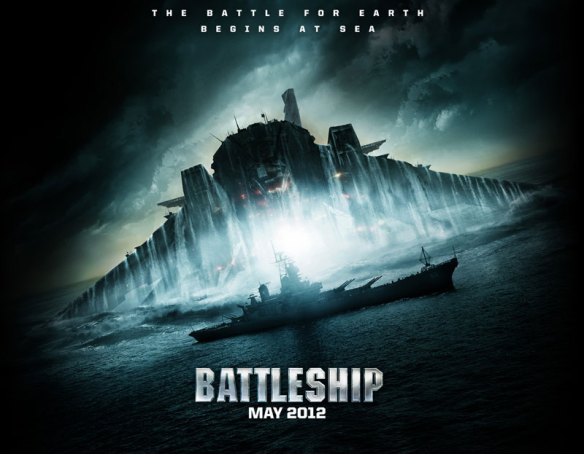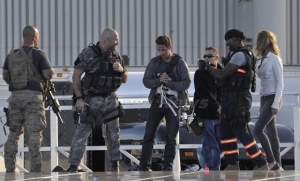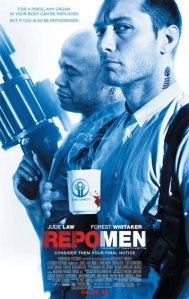“All men’s souls are immortal, but the souls of the righteous are immortal and divine.”
This quote, attributed to Socrates, appears in the opening sequence of director Tareq Singh’s sword-and-sandal, man-and-mortal elevated fantasy film, Immortals. The quote is a bit like the overall tone of the film: interesting, explicitly theological, somewhat true but not exactly scriptural. Marketed as being “from the same producers as 300,” it features incredible visuals, (including over-the-top violence similar to the aforementioned Spartan epic,) but a weak storyline. (I would rank it below 300, but above last year’s Clash of the Titans.) Despite a plot that is at times scattered and in-cohesive, and a setting that is more anachronistic than mythologicaly accurate, Immortals provides some excellent depictions of spiritual truths, and some very inspiring moments of demonstrated faithfulness. Overall I found this movie to be very thought-provoking, and I liked it.
The plot follows a man named Theseus, (Henry Cavill), favored by the gods to be their (and the human Hellenics’) hero in the fight against villainous King Hyperion, (Mickey Rourke), who is bent on causing destruction and chaos by unleashing the gods’ adversaries, the Titans. (They were imprisoned for eons by Zeus and his pantheon after losing a cosmic war). Just how or why Theseus can be useful or necessary isn’t really made clear, but Zeus says it is because the man “does not know danger, fear, defeat, or ridicule.”

The gods of Olympus watch the affairs on earth with concern.
The gods are obviously concerned with the affairs of mankind, (although it’s unclear whether they would care as much if the stakes didn’t directly threaten their position.) But according to Zeus, there is a “law” restricting the interaction of gods and men. “None of the mortals on earth should witness us in our immortal form,” he says at one point, and at another he commands that “no god shall interfere in the affairs of man, unless the Titans are unleashed. If we expect man to have faith in us, then we must have faith in him. We must allow him to use his own free will.”

Zeus in his mortal disguise (left, John Hurt) and his natural immortal appearance (right, Luke Evans).
Zeus still wants to influence humanity, however, so he uses an indirect method. He disguises himself as an elderly man, and mentors the fatherless Theseus from childhood, teaching him to fight as well as urging him to consider “finding a good reason to draw your sword in the first place.” Zeus says, “If there is one human who can lead them against Hyperion, it would be Theseus. But it must be his choice.” I really liked the illustration of this subtle strategy, because I do think that God prepares people for the roles he has in mind for them. Think of Moses, who grew up in an Egyptian palace, then lived in the wilderness for 40 years, which made him the perfect man to advocate against the Pharaoh and then lead his people in a long-term desert lifestyle. Or think of why Zechariah and Elizabeth were chosen to be the parents of John the Baptist. “Both of them were upright in the sigh of God, observing all the Lord’s commandments and regulations blamelessly,” (Luke 1:6), making them suitable parents to raise the man who would “make ready a people prepared for the Lord,” (Luke 1:17). You could even compare Zeus’s choice of a mortal hero in Theseus to God’s choice of David as the next king of Israel, even though he didn’t appear as physically kingly as his older brothers, because “the LORD does not look at the things man looks at. Man looks at the outward appearance, but the LORD looks at the heart.” (1 Samuel 16:7).
However, unlike the deities depicted in this film, it’s important to note that the Bible does not describe a God that resists explicitly “interfering” in the affairs of man. Instead,we see a God that walks with his creation in the Garden of Eden, that tells Noah to build an ark and shuts the door of it, that speaks to Moses directly, that appears to the people of Israel as a column of smoke and fire, that desires his people to build a place of worship for his presence to reside, that sends his angels to deliver messages and encouragement or break people out of prison. Time and again God intervenes and interacts directly with humans, and though he does rely on humans in the ways described above, we can take comfort that we will never hear him say something like the lines Zeus utters to Theseus (after Ares and Athena break his law):
No god will ever come to your aide again. Do you understand, mortal? I have faith in you, Theseus. Prove me right.”
Our God, by contrast, states dozens of times that he will answer our prayers, and even when Jesus is tasking his disciples with the monumental task of spreading the gospel to the entire world, he promises:
And surely I am with you always, to the very end of the age. –Matthew 28:20

Athena brings a gift of horses. "They will run until their hearts give out."
Many human characters in this movie say they don’t believe in the gods or don’t think they are worthy of worship because they didn’t appear to answer their prayers. Hyperion’s vow to “end the reign of the gods” is motivated by the lack of the gods’ intervention to prevent the murders of his entire family. Well, this is a very difficult and real dilemma. It is difficult to reconcile faith in an all-powerful God with the reality of terrible suffering daily observed here on earth, it can feel at times even to the most devout people as if God isn’t listening. But the scriptures tell us,
This is the confidence we have in approaching God: that if we ask anything according to his will, he hears us. And if we know that he hears us–whatever we ask–we know that we have what we asked of him.” –1 John 5:14-15.
One of the important things to note in this passage is that it is a conditional statement–“if we ask according to his will” Not just “if we ask”. If we are honestly thinking about God’s will when we pray, we will have to be open to the idea that he might have a larger plan that doesn’t coincide with what we think we need or want right now. When Joseph was thrown into the pit by his brothers, do you suppose he was praying that he would get out and be able to return home? Do you suppose he felt that God hadn’t answered his prayer when he was instead sold into slavery? Yet it was Joseph who later realized, “You intended to harm me, but God intended it for good to accomplish what is now being done, the saving of many lives.” (Genesis 50:20). There is a similarly cool moment in Immortals that illustrates how prayers might be answered in ways you weren’t even thinking about at the time, that end up being better than you could have known to ask for.
**SPOILER ALERT** A character literally branded as a thief describes his disbelief in the gods by saying, “When I was just a boy I prayed to the gods, for a horse. But the gods never answered me. So I stole one instead.” But at a crucial moment in their travels when they desperately need to race to their destination, Athena gifts the group with horses that take them to the gates just in time, then collapse. The thief marvels, “it’s the horse I prayed for as a boy!” Not given to him as a child when it was a frivolous request, but when he was an adult in desperate need. **END SPOILER**
Other characters, including a council leader, dismiss the idea of the gods entirely, saying:
I understand there are many Hellenics who put faith in gods and legends, but we in the Hellenic Council do not. They are metaphors, myths! We are a society of laws based on negotiation and reason.
Really, the spectrum of characters in their belief or disbelief in this movie mirror those in our society today. There are some who believe devoutly, (like Theseus’ mother and the Virgin Oracle Phaedra), some who are ambivalent (like Theseus is initially), some who claim a lack of evidence that the gods exist (like the thief), some who angrily and bitterly reject God, blaming him for their painful experiences (like Hyperion), and some who claim science and logic as their god, (like the council members).

Hyperion is pretty purely evil. He reminds me of 1 Peter 5:8, "Your enemy the devil prowls around like a roaring lion looking for someone to devour," partly because he was literally devouring food in several scenes.
Hyperion goes on and on in this movie in disgusting detail about his “seed” and how he will create immortality for himself on earth by leaving an extensive physical legacy, (i.e. he will rape and impregnate as many women as possible). He offers the same chance to Theseus, who responds, “My deeds will make me immortal. Flesh is fleeting, deeds are eternal.” While I’m not certain how theologically accurate it is to say that “deeds” themselves are eternal, I do think the Bible is clear on the consequences of deeds being eternal. Word choice aside, Theseus is displaying a perspective that is Biblical, the sense that there is something greater than this world and what the world defines as worthwhile or everlasting. The Bible says:
Do not store up for yourselves treasures on earth, where moth and rust destroy, and where thieves break in and steal. But store up for yourselves treasures in heaven, where moth and rust do not destroy, and where thieves do not break in and steal. -Matthew 6:19-20
The Expositor’s Bible Commentary posits that “treasures in heaven” in this passage “refers to whatever is of good and eternal significance that comes out of what is done on earth. Doing righteous deeds, suffering for Christ’s sake, forgiving one another–all these have the promise of ‘reward.'” (D. A. Carson, vol. 8). Perhaps this is in line with what a disguised Zeus tells the young hero when he says, “It’s not living as such that’s important, Theseus, it’s living rightly.”
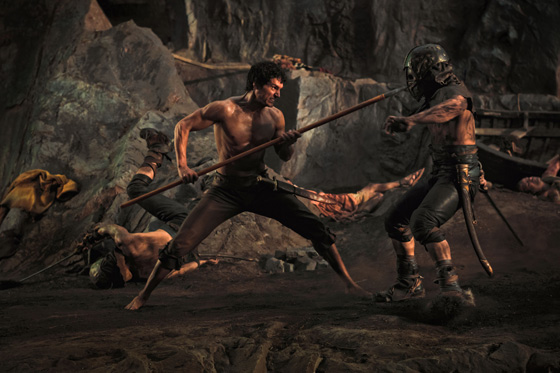
One example of the incredible amount of violence: in the scene above, Theseus kills 11 people within seconds of each other as he fights his way towards saving a loved one. I mean, it's pretty impressive...but very violent. (In a separate fight scene he uses a single spear to kill three people, breaking it off and using the leftovers to stab the next person. I totally understand if you are either repulsed or awed by that; for the record, I was awed.)
There are some incredible moments of ultimate devotion and loyalty in this movie. They are another one of the reasons why it is rated R, since they involve people being tortured and maimed. In one instance, Hyperion taunts a monk, saying he knows it is against the monk’s vows to kill either himself or another person, so he might as well give up his weapon and tell them the location of the Virgin Oracle already. The monk’s response is to cut off his own tongue, in order not to break any of his vows, (including his vow to protect the Oracle). It’s an incredible act, reminiscent of the passage where Jesus talks about cutting off body parts that cause you to sin, (Mark 9:43-47), and while I think it’s pretty obvious that Jesus was using hyperbole, it’s still an incredibly powerful visual. Being that dedicated to a cause, that determined to avoid behaviors offensive to your beliefs.
**SPOILER-Y SIDETRACK** The undying loyalty of the Virgin Oracle’s faithful protectors makes the way she so quickly sleeps with Theseus and tosses away her ability to see the future (which she can only do as long as she is “pure”) very disappointing. Her reasoning sounds completely selfish, especially when contrasted against the actions of her followers who literally died for her, being cooked to death and each still refusing to stop murmuring “I am the oracle” to protect her identity. “You were right, Theseus, my visions are a curse. I want to see the world with my own eyes, feel with my own heart, touch with my own flesh.” A lot of things about her plotline are disappointing, actually, like, what was the point of her leading Theseus to retrieve the Epirus bow? They lost it almost immediately, by knowingly walking into what they knew was a trap. This is what I meant by scattered, seemingly pointless plot. Also, why was it necessary for Theseus to be ‘leading’ this human army anyway? I mean, the titans were unleashed! So everyone kind of failed, didn’t they? But I guess as Zeus says at the end, it’s not over yet, the battle wages on…maybe the point is, things don’t always work out the way either side planned? **END SPOILER-Y SIDETRACK**

Theseus wields the magically powerful Epirus bow, "a weapon forged by Heracles."
Perhaps my favorite visual from this film was the triple-layered battle scene towards the end. I think it is a fantastic depiction of the multiple levels of good versus evil that exist in our world daily. We’re given few details about the way angels and demons interact with our world, (see Daniel 10 for one reference), but we do know that the forces of good and evil are at war, not always within our view, and just as Zeus says, “the fight against evil never ends.”
For our struggle is not against flesh and blood, but against the rulers, against the authorities, against the powers of this dark world and against the spiritual forces of evil in the heavenly realms. –Ephesians 6:12
Unseen to most humans, angels and demons struggle against each other in the spiritual realm, just as the gods and titans wage war in the film. Meanwhile, mankind is at war with itself, just as humans are forever struggling as a society against our darker sections, against oppression, against poverty, against injustice, against inequality, against lies, against hatred. (And yes, humans also go to literal war against each other all to often, unfortunately not always as a part of this struggle for the greater good). Finally, the one-on-one fight between Theseus and Hyperion can represent the struggle of the individual, to not be swayed by dark temptations, to overcome the fight against evil in their own hearts even as they take part in the ongoing battles around them. It really is a constant struggle, on all sides.
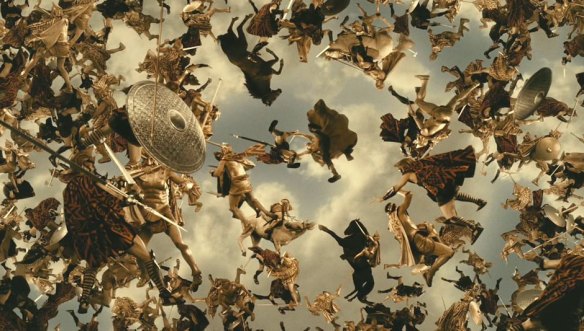
The ongoing battle between good and evil in the unseen spiritual realm.
Just before Hyperion desecrates a temple, a priest warns, “It’s not too late to end this madness. Salvation can be yours if you wish it.” As you can imagine, Hyperion doesn’t exactly take him up on his offer, but it is a true statement. It is never too late, not even if you are the baddest bad guy. It’s not too late to join the ongoing war against evil, starting with the battle in your own heart.
Do not be overcome by evil, but overcome evil with good. –Romans 12:21


